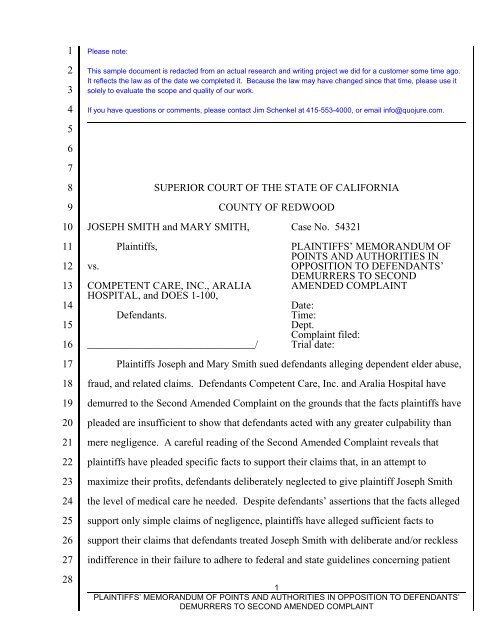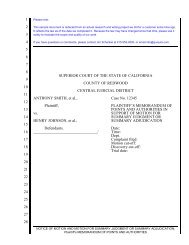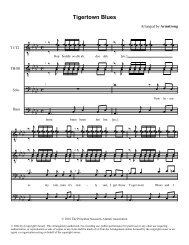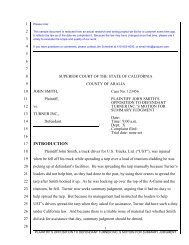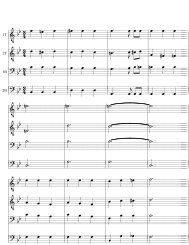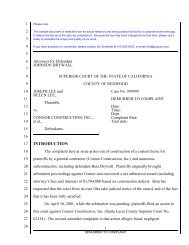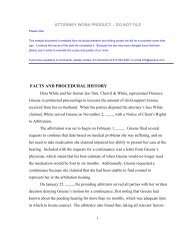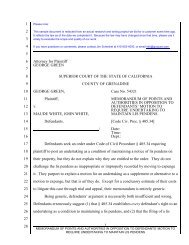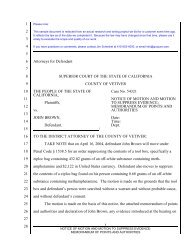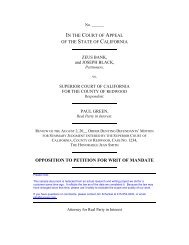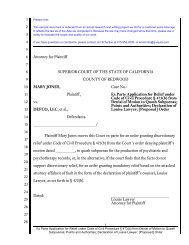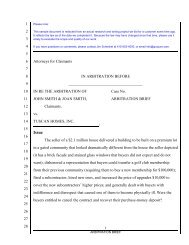Opposition to Demurrer - Quo Jure Corporation
Opposition to Demurrer - Quo Jure Corporation
Opposition to Demurrer - Quo Jure Corporation
You also want an ePaper? Increase the reach of your titles
YUMPU automatically turns print PDFs into web optimized ePapers that Google loves.
1<br />
2<br />
3<br />
4<br />
5<br />
6<br />
7<br />
8<br />
9<br />
10<br />
11<br />
12<br />
13<br />
14<br />
15<br />
16<br />
17<br />
18<br />
19<br />
20<br />
21<br />
22<br />
23<br />
24<br />
25<br />
26<br />
27<br />
28<br />
Please note:<br />
This sample document is redacted from an actual research and writing project we did for a cus<strong>to</strong>mer some time ago.<br />
It reflects the law as of the date we completed it. Because the law may have changed since that time, please use it<br />
solely <strong>to</strong> evaluate the scope and quality of our work.<br />
If you have questions or comments, please contact Jim Schenkel at 415-553-4000, or email info@quojure.com.<br />
SUPERIOR COURT OF THE STATE OF CALIFORNIA<br />
JOSEPH SMITH and MARY SMITH,<br />
vs.<br />
Plaintiffs,<br />
COMPETENT CARE, INC., ARALIA<br />
HOSPITAL, and DOES 1-100,<br />
Defendants.<br />
________________________________/<br />
COUNTY OF REDWOOD<br />
Case No. 54321<br />
PLAINTIFFS’ MEMORANDUM OF<br />
POINTS AND AUTHORITIES IN<br />
OPPOSITION TO DEFENDANTS’<br />
DEMURRERS TO SECOND<br />
AMENDED COMPLAINT<br />
Date:<br />
Time:<br />
Dept.<br />
Complaint filed:<br />
Trial date:<br />
Plaintiffs Joseph and Mary Smith sued defendants alleging dependent elder abuse,<br />
fraud, and related claims. Defendants Competent Care, Inc. and Aralia Hospital have<br />
demurred <strong>to</strong> the Second Amended Complaint on the grounds that the facts plaintiffs have<br />
pleaded are insufficient <strong>to</strong> show that defendants acted with any greater culpability than<br />
mere negligence. A careful reading of the Second Amended Complaint reveals that<br />
plaintiffs have pleaded specific facts <strong>to</strong> support their claims that, in an attempt <strong>to</strong><br />
maximize their profits, defendants deliberately neglected <strong>to</strong> give plaintiff Joseph Smith<br />
the level of medical care he needed. Despite defendants’ assertions that the facts alleged<br />
support only simple claims of negligence, plaintiffs have alleged sufficient facts <strong>to</strong><br />
support their claims that defendants treated Joseph Smith with deliberate and/or reckless<br />
indifference in their failure <strong>to</strong> adhere <strong>to</strong> federal and state guidelines concerning patient<br />
1<br />
PLAINTIFFS’ MEMORANDUM OF POINTS AND AUTHORITIES IN OPPOSITION TO DEFENDANTS’<br />
DEMURRERS TO SECOND AMENDED COMPLAINT
1<br />
2<br />
3<br />
4<br />
5<br />
6<br />
7<br />
8<br />
9<br />
10<br />
11<br />
12<br />
13<br />
14<br />
15<br />
16<br />
17<br />
18<br />
19<br />
20<br />
21<br />
22<br />
23<br />
24<br />
25<br />
26<br />
27<br />
28<br />
treatment <strong>to</strong> avoid pressure sores. In Joseph Smith’s case, defendants’ reckless and<br />
indifferent failure <strong>to</strong> adhere <strong>to</strong> these standards of care, which in plaintiff’s case meant<br />
supplying a bed long enough for his 6' 4" frame, led <strong>to</strong> his developing advanced pressure<br />
sores on his feet, which later required amputation of his legs from the knee down.<br />
Defendants’ demurrers <strong>to</strong> the SAC focus on what they claim is a deficiency of<br />
facts alleged <strong>to</strong> demonstrate that they acted with any degree of culpability other than mere<br />
negligence. But the facts alleged, and incorporated by reference in<strong>to</strong> each cause of<br />
action, show that defendants were aware of the dangerous probability that their policy of<br />
ignoring federal and state guidelines <strong>to</strong> maximize profits would result in patient injuries<br />
such as those suffered by Joseph Smith. Further, any factual deficiencies in the pleading<br />
of some claims can be cured by amendment.<br />
ARGUMENT<br />
1. As <strong>to</strong> any claim <strong>to</strong> which a demurrer is sustained, the Court should<br />
grant plaintiffs leave <strong>to</strong> amend because the claimed defects can be cured<br />
through additional amendments.<br />
In ruling on a demurrer, a court construes the complaint “liberally . . . with a view<br />
<strong>to</strong> substantial justice between the parties.” Code Civ. Proc. § 452; see Stevens v. Superior<br />
Court (1999) 75 Cal.App.4th 594, 601. A complaint that shows some right <strong>to</strong> relief, even<br />
if the facts are not clearly stated, is generally held sufficient against demurrers. See, e.g.,<br />
Gressley v. Williams (1961) 193 Cal.App.2d 636, 639. Even if a demurrer is sustained,<br />
leave <strong>to</strong> amend a complaint is routinely granted. It is an abuse of discretion for the court<br />
<strong>to</strong> deny leave <strong>to</strong> amend where there is any reasonable possibility that the plaintiff can<br />
state a good cause of action. Goodman v. Kennedy (1976) 18 Cal.3d 335, 349. Since<br />
plaintiffs here have pleaded sufficient facts <strong>to</strong> state proper claims against defendants, the<br />
Court should overrule their demurrers. But even if the Court does identify some defect in<br />
any of these claims, the Court should grant plaintiffs leave <strong>to</strong> amend <strong>to</strong> cure it.<br />
2<br />
PLAINTIFFS’ MEMORANDUM OF POINTS AND AUTHORITIES IN OPPOSITION TO DEFENDANTS’<br />
DEMURRERS TO SECOND AMENDED COMPLAINT
1<br />
2<br />
3<br />
4<br />
5<br />
6<br />
7<br />
8<br />
9<br />
10<br />
11<br />
12<br />
13<br />
14<br />
15<br />
16<br />
17<br />
18<br />
19<br />
20<br />
21<br />
22<br />
23<br />
24<br />
25<br />
26<br />
27<br />
28<br />
2. Plaintiffs have stated a proper claim for willful misconduct.<br />
Willful misconduct is a recognized cause of action in California, and it is distinct<br />
from a negligence cause of action. In New v. Consol. Rock Products Co. (1985) 171<br />
Cal.App.3d 681, 688-690, the court explained the distinction between claims for mere<br />
negligence and those involving willful misconduct:<br />
“Three essential elements must be present <strong>to</strong> raise a negligent act <strong>to</strong> the level<br />
of wilful misconduct: (1) actual or constructive knowledge of the peril <strong>to</strong> be<br />
apprehended, (2) actual or constructive knowledge that injury is a probable,<br />
as opposed <strong>to</strong> a possible, result of the danger, and (3) conscious failure <strong>to</strong> act<br />
<strong>to</strong> avoid the peril.”<br />
Id. at 689-690 (citing Morgan v. Southern Pacific Trans. Co. (1974) 37<br />
Cal.App.3d 1006, 1012; citations omitted).<br />
The distinction between negligence and willful misconduct is the defendant’s state of<br />
mind. “Willful misconduct means something different from and more than negligence,<br />
however gross.” Perez v. Southern Transportation Co. (1990) 218 Cal.App.3d 462, 470-<br />
471. Willful misconduct is a cause of action an elderly patient may assert against a<br />
skilled nursing facility. “Possible causes of action that might be incorporated in a<br />
complaint against a skilled nursing facility include: willful misconduct in violation of a<br />
statu<strong>to</strong>ry or regula<strong>to</strong>ry duty.” CALIFORNIA ELDER LAW LITIGATION: AN ADVOCATE’S<br />
GUIDE (CEB 1998) §§ 12:42-12:43. This is precisely what plaintiff’s first claim for<br />
willful misconduct alleges here. SAC, 34-40.<br />
Defendant Competent Care protests that, “[i]n the context of healthcare services,<br />
wilfulness is a legal reference <strong>to</strong> the degree of intent involved in the commission of an<br />
underlying <strong>to</strong>rt, not a distinct cause of action in itself.” Competent’s Memorandum at<br />
4:13-14. But if one ignores the title of this claim, the facts pleaded support a cause of<br />
action for negligence and punitive damages based on malice and oppression as defined by<br />
Civil Code § 3294. Thus even if the Court finds plaintiffs’ claim for willful misconduct<br />
3<br />
PLAINTIFFS’ MEMORANDUM OF POINTS AND AUTHORITIES IN OPPOSITION TO DEFENDANTS’<br />
DEMURRERS TO SECOND AMENDED COMPLAINT
1<br />
2<br />
3<br />
4<br />
5<br />
6<br />
7<br />
8<br />
9<br />
10<br />
11<br />
12<br />
13<br />
14<br />
15<br />
16<br />
17<br />
18<br />
19<br />
20<br />
21<br />
22<br />
23<br />
24<br />
25<br />
26<br />
27<br />
28<br />
inappropriate, they are entitled <strong>to</strong> leave <strong>to</strong> amend.<br />
3. Plaintiffs have alleged sufficient facts <strong>to</strong> state a proper claim for<br />
intentional infliction of emotional distress.<br />
Defendants’ demurrer <strong>to</strong> this claim centers around the intent required <strong>to</strong> establish a<br />
claim for intentional infliction of emotional distress. That element requires either an<br />
actual intent <strong>to</strong> cause emotional distress in the plaintiff, or a reckless disregard of the<br />
probability that harm will result. Molko v. Holy Spirit Assn. (1986) 46 Cal.3d 1092, 1120.<br />
Plaintiffs have pleaded facts sufficient <strong>to</strong> establish that defendants acted with a<br />
reckless disregard of the probability that Joseph Smith would suffer severe emotional<br />
distress as a result of their deliberate neglect while he was in their care. The complaint<br />
explains that there are elaborate federal and state guidelines as <strong>to</strong> what treatment patients<br />
require <strong>to</strong> avoid pressure sores. It also alleges that defendants made a deliberate choice<br />
not <strong>to</strong> supply a bed of proper length <strong>to</strong> meet that standard of patient care, and instructed<br />
its employees not <strong>to</strong> follow the guidelines.<br />
Defendants’ reliance on Christiansen v. Superior Court (1991) 54 Cal.3d 868 is<br />
inapposite. Although that decision does state that the defendant’s conduct at issue must<br />
be directed at the plaintiff (id. at 904-905), the plaintiffs in that case were survivors of<br />
deceased persons suing for mishandling of their loved ones’ corpses. Here, the<br />
outrageous and reckless treatment of Joseph Smith was directed at him. Therefore he has<br />
stated a proper claim for intentional infliction of emotional distress.<br />
4. Plaintiffs have pleaded a proper claim for fraud.<br />
Defendants contend that plaintiffs are required <strong>to</strong> “name names” <strong>to</strong> meet the<br />
specificity requirement for pleading a claim for fraud. Courts have long recognized that<br />
the purpose of the specificity requirement is <strong>to</strong> give defendants explicit notice of the<br />
conduct alleged as fraudulent, but that “the requirement of specificity is relaxed when the<br />
4<br />
PLAINTIFFS’ MEMORANDUM OF POINTS AND AUTHORITIES IN OPPOSITION TO DEFENDANTS’<br />
DEMURRERS TO SECOND AMENDED COMPLAINT
1<br />
2<br />
3<br />
4<br />
5<br />
6<br />
7<br />
8<br />
9<br />
10<br />
11<br />
12<br />
13<br />
14<br />
15<br />
16<br />
17<br />
18<br />
19<br />
20<br />
21<br />
22<br />
23<br />
24<br />
25<br />
26<br />
27<br />
28<br />
allegations indicate that the defendant must necessarily possess full information<br />
concerning the facts of the controversy [] or when the facts lie more directly in the<br />
knowledge of the opposite party [].” Tarmann v. State Farm Mut. Au<strong>to</strong> Ins. Co. (1991) 2<br />
Cal.App.4th 153, 157-158. Defendants’ own records contain the information about the<br />
misrepresentations and concealments about which plaintiffs complain.<br />
Additionally, the complaint pleads that defendants, as health care professionals,<br />
owed Joseph Smith a fiduciary duty based on their cus<strong>to</strong>dial relationship. SAC, 51.<br />
See Estate of Shinkle (2002) 97 Cal.App.4th 990, 992 (nursing home facilities fall within<br />
code definitions of cus<strong>to</strong>dians of the elderly, invoking presumption that any donative<br />
transfer <strong>to</strong> them is invalid as under duress or fraud). Under these circumstances,<br />
justifiable reliance on defendants’ statements can be presumed.<br />
The complaint pleads facts sufficient <strong>to</strong> place defendants on notice of the false<br />
representations and concealments alleged against them. SAC, 50-53. The identities of<br />
their employees directly responsible in Joseph Smith’s case are more readily accessible <strong>to</strong><br />
defendants than <strong>to</strong> plaintiffs, and are matters for discovery. The Court should thus<br />
overrule the demurrers <strong>to</strong> plaintiffs’ third claim for fraud.<br />
5. Plaintiffs’ fifth and sixth claims for intentional violation of federal and<br />
state laws and regulations allege facts sufficient <strong>to</strong> state proper claims.<br />
Defendants contend that plaintiffs’ fifth and sixth causes of action fail <strong>to</strong> plead<br />
specifically the particular conduct of defendants that violated the statutes. This ignores<br />
the fact that these claims incorporate by reference the detailed allegations appearing<br />
earlier in the complaint. See SAC, 67, 72.<br />
Defendants’ other disputes with these claims are purely a matter of semantics. As<br />
explained in plaintiffs’ opposition <strong>to</strong> defendants’ demurrers <strong>to</strong> their First Amended<br />
Complaint, no matter how these statu<strong>to</strong>ry claims are titled, they plead proper claims for<br />
negligence per se accompanied by a request for punitive damages because the conduct<br />
5<br />
PLAINTIFFS’ MEMORANDUM OF POINTS AND AUTHORITIES IN OPPOSITION TO DEFENDANTS’<br />
DEMURRERS TO SECOND AMENDED COMPLAINT
1<br />
2<br />
3<br />
4<br />
5<br />
6<br />
7<br />
8<br />
9<br />
10<br />
11<br />
12<br />
13<br />
14<br />
15<br />
16<br />
17<br />
18<br />
19<br />
20<br />
21<br />
22<br />
23<br />
24<br />
25<br />
26<br />
27<br />
28<br />
alleged was intentional and/or reckless. The complaint alleges that the specified federal<br />
and state regulations imposed a particularized duty of care on defendants, which they<br />
willfully and consciously disregarded. Those explicit regulations were designed <strong>to</strong><br />
protect patients against precisely the sort of injury Joseph Smith suffered. Thus, the facts<br />
pleaded state proper claims for negligence per se under Evidence Code § 669, coupled<br />
with claims for punitive damages under Civil Code § 3294. The Court should overrule<br />
the demurrers <strong>to</strong> these claims, or, in the alternative, grant plaintiffs leave <strong>to</strong> amend.<br />
CONCLUSION<br />
The federal and state governments have issued explicit guidelines on patient<br />
treatment <strong>to</strong> avoid development of pressure sores. In the case of an elderly diabetic such<br />
as plaintiff Joseph Smith, the risks of developing pressure sores are even more acute than<br />
in the average patient. Defendants deliberately and recklessly ignored these regulations<br />
in caring for plaintiff until his infection became so severe that it required partial<br />
amputation of his legs. Despite defendants’ repeated attempts <strong>to</strong> excuse their<br />
mistreatment of plaintiff Joseph Smith as mere negligence, the facts pleaded show that<br />
their conduct recklessly disregarded his health and safety. Further, despite defendants’<br />
arguments that various claims are not proper based on how they are titled, the facts<br />
pleaded support proper claims. For these reasons, as well as those set forth above,<br />
plaintiffs respectfully request that the Court overrule defendants’ demurrers <strong>to</strong> their<br />
Second Amended Complaint, or, if it sustains the demurrers, that it grant leave <strong>to</strong> amend.<br />
Dated:<br />
Respectfully submitted,<br />
_____________________________<br />
At<strong>to</strong>rney for Plaintiffs<br />
6<br />
PLAINTIFFS’ MEMORANDUM OF POINTS AND AUTHORITIES IN OPPOSITION TO DEFENDANTS’<br />
DEMURRERS TO SECOND AMENDED COMPLAINT


